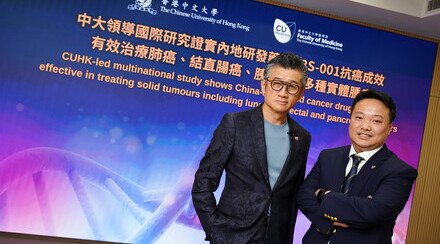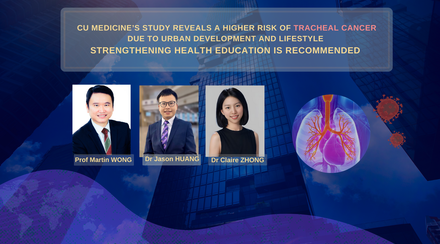The Chinese University of Hong Kong Nethersole School of Nursing hosts the Fifth Pan-Pacific Nursing Conference and Seventh Nursing Symposium on Cancer Care
More than 500 healthcare delegates from over 20 countries attended the Fifth Pan-Pacific Nursing Conference and Seventh Nursing Symposium on Cancer Care hosted by the Nethersole School of Nursing (the School) at the Faculty of Medicine, The Chinese University of Hong Kong (CUHK) today (22 September). This conference will last for 3 days till 24 September. It is one of the key celebratory activities of the School’s 20th anniversary.
The School has been hosting the Pan-Pacific Nursing Conference since 1999, which has subsequently become a regular event in the nursing conference calendar in the Pan-Pacific region and internationally. The theme of this year's conference is "Issues, challenges, and future directions of evidence-based healthcare". Considering the growing importance of evidence-based practice in global healthcare development, this conference aims to pool the efforts of nurses and other healthcare professionals from across cultures and disciplines to explore innovative strategies for the delivery of evidence-based practice in achieving the best possible client outcomes, and to identify a road map for future development of evidence-based healthcare locally, regionally and globally.
The Opening Ceremony of the conference was officiated by Dr. Wang Liji, Director-General, Department of International Cooperation/ Office of Taiwan, Hong Kong & Macao Affairs, Ministry of Health, People's Republic of China; Professor Gabriel Leung, JP, Under Secretary for Food and Health, Hong Kong Special Administrative Region; Professor Joseph Sung, Vice-Chancellor and President, CUHK; and Professor Diana Lee, Chair Professor of Nursing and Director, the Nethersole School of Nursing, CUHK.

The Opening Ceremony of the Fifth Pan-Pacific Nursing Conference and Seventh Nursing Symposium on Cancer Care.
Following the ceremony, the Opening Speaker, Dr. Manual Dayrit, Director of Department of Human Resources for Health, World Health Organisation gave an opening address entitled "Global perspectives on human resources for health", which looked into the issues of primary healthcare and transformation of health systems with particular reference to human resources for health. Professor Gabriel Leung also delivered a keynote address discussing the evidence-based healthcare development in Hong Kong. In the coming two days, five more keynote addresses will be presented by internationally renowned evidence-based healthcare experts.
In common with many other countries and cities, Hong Kong is now facing major healthcare challenges including an ageing population, healthcare manpower shortage, and increasing medical cost. During the 3-day conference, speakers and participants will address these global healthcare challenges from an evidence-based point of view. Evidence-based healthcare will be examined from the human resources, social, cultural, gender, ethnical, geographical, political, and other perspectives. Their dynamic and fruitful discussions will focus on a wide range of theme-related topics, such as: the conscientious use of current best practice in conjunction with clinical experience and patient preferences in enhancing the quality of care and cost effectiveness; novel evidence-based interventions in improving cancer care and the quality of life of cancer survivors; diversified approaches of pain and symptom management for different types of diseases and wounds; implementation of evidence-based healthcare with traditional Chinese medicine, and complementary and alternative medicine approaches such as acupressure; challenges and future directions of advanced nursing practice in the hospital and community; nurse-patient relationships in facilitating evidence-based practice; nursing leadership for supporting evidence-based healthcare; and innovative strategies for teaching and promoting evidence-based healthcare in nursing education.
During the conference, a total of 213 scientific abstracts relating to the conference theme will be presented. A series of professional workshops and sessions will also be organized to encourage participants' interactive exchange of experience and views on specific evidence-based healthcare topics.






















































